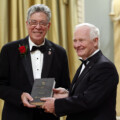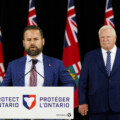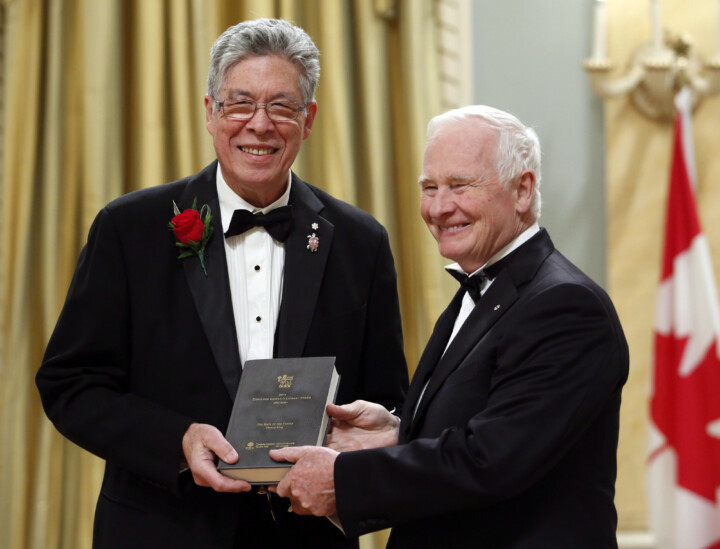This is a week of anniversaries and historic milestones that tell us something about human agency and the world.
Tuesday marked the one-month anniversary of Hamas’ terrorist attacks against Israel. It means that it has now been just over one month that 37 children—including 10-month-old Kfir Bibas who is the same age as my son—have been held captive in Gaza.
The barbarity of the attacks (which we have learned more about in the ensuing month) is evidence of Solzhenitsyn’s observation that evil runs through the heart of man. No amount of contextualization can justify the kidnapping and murder of children. That these murderous thugs were gleeful about their cruelty and carnage is a reminder that the world is a dangerous place and history doesn’t arc in a particular direction. Its unfolding requires those committed to peace, security, and justice to remain vigilant and strong.
The first responses to Hamas’ attacks were expressions of such personal bravery and honour on the part of ordinary Israelis who fought back against the barbarism of their self-appointed executioners. I think for instance of Anula Ratnayaka, a Sri Lankan caregiver who was heroically killed hiding the elderly woman she cared for, or Amir Tibon, whose retired parents drove from Tel Aviv to rescue him and his young family, or the countless others who exposed themselves to great risk and even death to protect their loved ones.
These were extraordinary acts of love and sacrifice. But they were also powerful displays of personal agency and self-determination. Ordinary citizens refused to cede control to their tormentors. They knew that they were on the side of justice.
Former U.S. President Ronald Reagan instinctively understood this impulse even if many of his Cold War contemporaries forgot it. He was ridiculed and resisted by the foreign policy establishment for his view that the contest between the West and Soviet communism must be won rather than merely managed—including of course his historic speech at the Berlin Wall in June 1987. But he was right and they were wrong.
Less than two years later, on November 9, 1989, which is 34 years this week, the wall came down, and in so doing signified the end of Soviet totalitarianism and the renewed promise of freedom for millions of people.
The wall’s collapse was a victory for human agency over the Marxist notion of History with a capital “H”. That the great expectation of an “end of history” has failed to materialize in the post-Cold War world isn’t a counterargument. It only reinforces the fact that we cannot grant deference to inexorable forces. There is no endpoint in the realm of human affairs. There are only the ongoing actions and choices of individuals.
Reagan’s instincts were shaped by the experience of World War II which represented the ultimate expression of agency over ideology. He beautifully conveyed these ideas in his 1984 speech to mark the 40th anniversary of the Normandy invasion and the history-shaping role of rather ordinary servicemen. This weekend, as we mark Remembrance Day, his remarks apply to our current moment. As he put it then:
The men of Normandy had faith that what they were doing was right, faith that they fought for all humanity, faith that a just God would grant them mercy on this beachhead or on the next. It was the deep knowledge—and pray God we have not lost it —that there is a profound, moral difference between the use of force for liberation and the use of force for conquest. You were here to liberate, not to conquer, and so you and those others did not doubt your cause. And you were right not to doubt.
One month after Hamas’ terrorism grievously reminded us of the presence of evil in the world, the acts of courage, grace, and love in response to their barbarism have demonstrated the powerful contradistinction that Reagan was referring to. History tells us individuals are sovereign over its unfolding, which itself is neutral on whether they ultimately tilt it in a good or bad direction. The test for us—and for future generations—is whether we can muster the courage and honour of ordinary yet heroic people like Ratnayaka to shape history in the direction of justice.
Ottawa has already moved on from the Trudeau government
This week, I traveled to Ottawa for a conference and accompanying meetings. After being here for a couple of days, I can definitively say that the town is increasingly moving on from the Trudeau government. Industry associations, non-profit organizations, think tanks, and so on are now grappling with what a Pierre Poilievre-led government would mean for them and their priorities. An election, in their minds, is a mere formality to give expression to what polls overwhelming tell us.
Of course, a lot can happen between now and the next election—and based on my meetings I can confirm that the Opposition leader’s office isn’t taking the outcome for granted—but it does feel like something in Ottawa has changed. These groups frenetically preparing for a change in government may prove to be a bellwether for election betting markets.
The possibility of a transition to a Conservative government has had me thinking about how transformational the creation of the Conservative Party itself has been on our politics. It will be twenty years next month that Stephen Harper and Peter MacKay came together to establish a centre-right party that could consistently compete in and win national elections.
One of the underrated consequences is that they created the conditions for a steady supply of Conservatives with recent government experience. Pierre Poilievre is a good example. Should he become prime minister, he will have more direct experience and a less steep learning curve than Harper had himself. He’ll have views about how cabinet should function, the role of central agencies, and the interaction between his office and the government as a whole. He’ll understand how to advance his priorities through the system and avoid getting bogged down in digressive stuff.
Similarly, his ministers and key staff will themselves generally be more familiar with how the government functions, how to work effectively with the bureaucracy, and oversee complex reforms such as possibly defunding the CBC. This stands in contrast with the early Harper government which, while it had former provincial cabinet ministers like Jim Flaherty and John Baird, had quite limited federal experience around the table.
In hindsight, these limitations (in addition to a series of minority parliaments) probably constrained the government’s ability to execute a more ambitious agenda. Program spending, for instance, was higher than it ought to have been. A Poilievre government should, by contrast, be better positioned to move forward with an ambitious centre-right policy agenda—particularly early in a governing mandate.
In this sense, Mr. Harper’s long-term legacy may be best understood in institutional terms rather than merely looking at his policy accomplishments. If “personnel is policy”, subsequent Conservative governments and their own policy reforms will be built on the strong foundation that he and Mr. MacKay established in December 2003.

Liberalism’s critics need better solutions
Last week, I had the huge thrill of recording a podcast with Washington Post columnist George Will in advance of his participation in the Munk Debate on the question of classical liberalism. He and British Conservative parliamentarian Jacob Rees-Mogg, who were arguing in favour of liberalism, were decisively defeated by their post-liberal (or illiberal) opponents.
I feel a bit self-conscious judging Will (who many Hub readers will know I’m a huge fan of) but his debate performance succumbed, in my judgement, to two major failures that are typical for proponents of liberal democratic capitalism to fall into.
The first is an unwillingness to grapple with the failures and mistakes that they—we—have made. During the debate, Will and Rees-Mogg sounded like post-Cold War triumphalists who hadn’t reckoned with many aspects of the past 30 years including elite failures with respect to China’s accession into the World Trade Organization, the wars in Afghanistan and Iraq, and the global financial crisis. Their aversion to confronting these mistakes rooted in the name of liberal ideas opened them up to criticism that they lacked any amount of introspection or self-correction.
The bigger flaw though is that they permitted their opponents to get away with attacking liberalism as the basic intellectual foundation of Western societies without matching their full-throated critique with proportionate thinking about the alternatives. One of their debate opponents, Sohrab Ahmari, in particular, used maximalist language to prosecute his case against liberalism—this wasn’t a judgement on the margins but rather a root and branch excoriation—and yet his prescriptions were pretty small-ball stuff, including restoring so-called “blue laws” to prohibit businesses from operating on Sundays.
One can or disagree with whether we ought to be able to shop on Sundays, but if you think the basic intellectual scaffolding of our entire civilization is broken, then you’d better have solutions that are more serious than essentially going back to South Dakota’s treatment of retail businesses from a few years ago.
One cannot help but think that these two adjustments to Will and Rees-Mogg’s arguments might have produced a different outcome. But who I am to correct George Will?
Recommended for You

The Thomas King saga proves Canada’s cultural establishment must end its identity obsession once and for all

Canadians hate ‘populism’—but love populist policies: The Weekly Wrap

Canadians must open their eyes to our growing culture of corruption

‘Albertans do not believe Canada works’: Rick Bell on whether the pipeline deal hurt Alberta separatism




